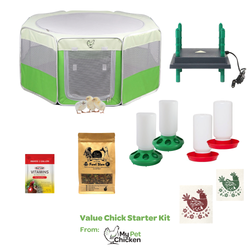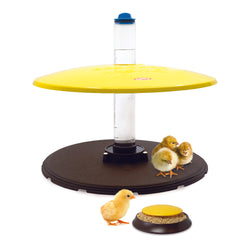All about Blackhead disease
Back to blog
All about Blackhead disease|Blackhead disease isn't likely to actually turn your chickens' heads black (thankfully!). In fact, it is much more likely to affect turkeys (wild or domestic) than your chickens. Interestingly enough, in history there were apparently some cases of turkeys whose heads actually did turn black because of this disease. Caused by a protozoan, it's important to keep your flock on a regular worming schedule to protect them from this disease. Read on to find out more:
Blackhead Also called
Enterohepatitis, histomoniasis
Prevalence
Common in turkeys, rare in chickens
Signs
General signs -
Sometimes no symptoms. Other times, lack of appetite, lethargy, huddling near heat source and fluffed up feathers. Loss of appetite, increased demand for water, loss of condition, flushed face.
Cardinal or diagnostic signs -
Occasionally bloody droppings. Lab diagnosis. Postmortem: sunken spots on liver (look like blackheads), cecal changes
Cause/s -
Histomonas meleagridis, which are protozoa that occur all over, but especially in soils that are moist or don't drain well.
Communicability
Yes. It can be spread by wild birds, insects, earthworms, and even by foraging in areas where infected droppings have fallen. It can occur as a secondary issue if your birds are suffering from cecal worms.
Communicability to humans
No.
Incubation period
One to two weeks
Latent
Yes, chickens who recover carry the protozoa. However, this is not a huge danger to healthy birds. You will want to put your flock on a regular worming schedule, though, to decrease the amount of protozoa they're exposed to. You will not want to start keeping turkeys with your chickens, either, as the turkeys are likely to get sick.
Endemic
Yes. The protozoa causing this infection are found naturally almost everywhere. However, chickens tend to be fairly resistant. If you keep turkeys with chickens (or live in an area with lots of wild turkeys), it's more likely your chickens will catch an infection from the turkeys, who are far more susceptible to this illness.
Home treatment and/or prevention
Prevention: The protozoa is ubiquitous, and spread by insects and wild birds, so keeping it out of your coop and run area can be difficult. That said, infection is unlikely if your chickens are kept in a clean, dry area, and any infestation of cecal worms is treated promptly.
Treatment: None known.
Veterinary care
Consult a vet to get a firm diagnosis and treatment for any other illnesses, infections or infestations (like worms) that may complicate blackhead or increase mortality.
Recovery
Some birds--about 1/3--may die, but most will recover.
Other conditions, illnesses and/or diseases with similar signs:
Many other conditions have a similar appearance to the layman's eye, since the outward signs of this illness are general signs of feeling ill (lethargy, ruffled feathers). Bloody droppings are common with other infections, like coccidiosis and digestive issues. Consult a vet for a firm diagnosis.
Blackhead Also called
Enterohepatitis, histomoniasis
Prevalence
Common in turkeys, rare in chickens
Signs
General signs -
Sometimes no symptoms. Other times, lack of appetite, lethargy, huddling near heat source and fluffed up feathers. Loss of appetite, increased demand for water, loss of condition, flushed face.
Cardinal or diagnostic signs -
Occasionally bloody droppings. Lab diagnosis. Postmortem: sunken spots on liver (look like blackheads), cecal changes
Cause/s -
Histomonas meleagridis, which are protozoa that occur all over, but especially in soils that are moist or don't drain well.
Communicability
Yes. It can be spread by wild birds, insects, earthworms, and even by foraging in areas where infected droppings have fallen. It can occur as a secondary issue if your birds are suffering from cecal worms.
Communicability to humans
No.
Incubation period
One to two weeks
Latent
Yes, chickens who recover carry the protozoa. However, this is not a huge danger to healthy birds. You will want to put your flock on a regular worming schedule, though, to decrease the amount of protozoa they're exposed to. You will not want to start keeping turkeys with your chickens, either, as the turkeys are likely to get sick.
Endemic
Yes. The protozoa causing this infection are found naturally almost everywhere. However, chickens tend to be fairly resistant. If you keep turkeys with chickens (or live in an area with lots of wild turkeys), it's more likely your chickens will catch an infection from the turkeys, who are far more susceptible to this illness.
Home treatment and/or prevention
Prevention: The protozoa is ubiquitous, and spread by insects and wild birds, so keeping it out of your coop and run area can be difficult. That said, infection is unlikely if your chickens are kept in a clean, dry area, and any infestation of cecal worms is treated promptly.
Treatment: None known.
Veterinary care
Consult a vet to get a firm diagnosis and treatment for any other illnesses, infections or infestations (like worms) that may complicate blackhead or increase mortality.
Recovery
Some birds--about 1/3--may die, but most will recover.
Other conditions, illnesses and/or diseases with similar signs:
Many other conditions have a similar appearance to the layman's eye, since the outward signs of this illness are general signs of feeling ill (lethargy, ruffled feathers). Bloody droppings are common with other infections, like coccidiosis and digestive issues. Consult a vet for a firm diagnosis.



